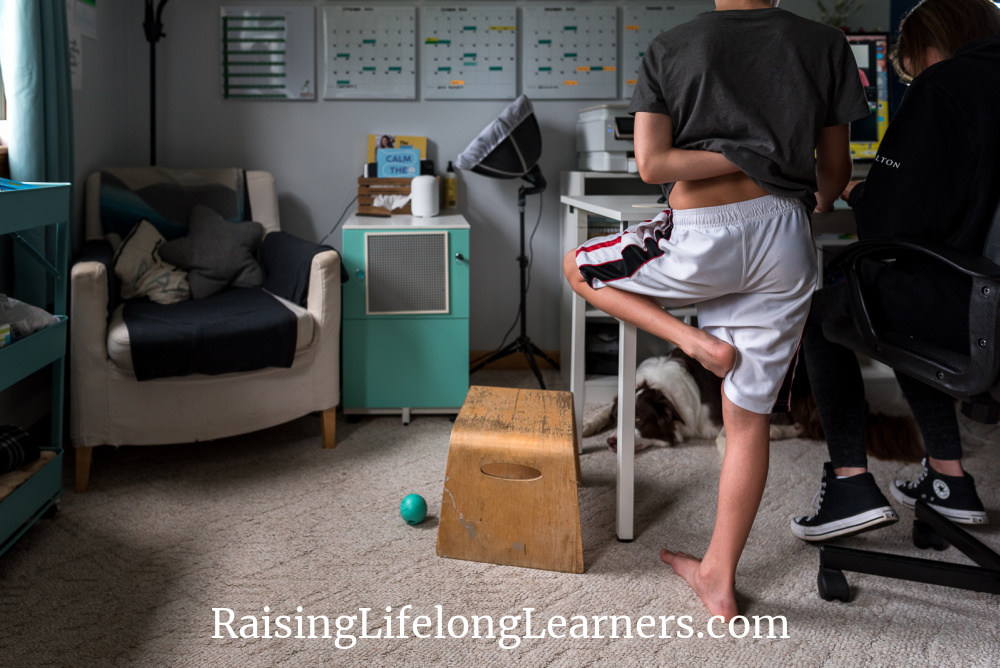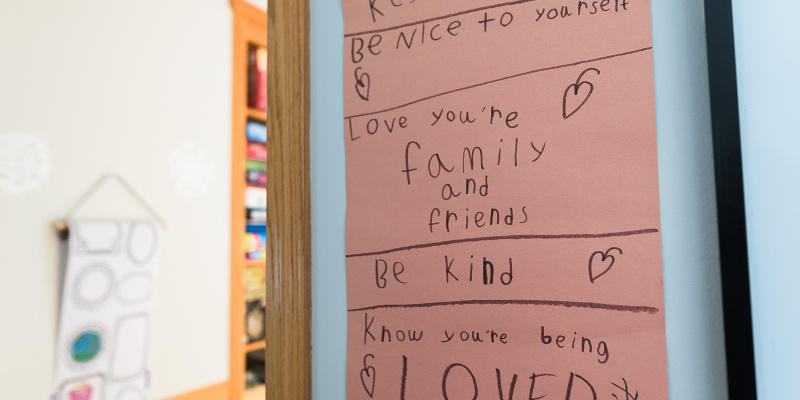Helping Our Kids Self-Regulate with Sarah Collins
As parents, we all strive to provide the best for our children, but when it comes to neurodivergent kids, there’s an extra layer of care and attention needed. One crucial aspect of understanding and supporting these unique kiddos is recognizing and addressing their sensory needs. Sensory processing is a fundamental part of their world, and it influences their ability to focus, maintain attention, and self-regulate.

Recognizing Sensory Challenges
The first step in this journey is honing your observation skills to better understand your child’s sensory needs. Your child might exhibit what we call seeking behaviors – these are attempts to meet their sensory needs. It could be wiggling, moving excessively, maintaining a slouched posture, pressing their body against furniture, or even crashing into walls. They might hide under objects. These behaviors are their way of communicating their sensory preferences.
Addressing Sensory Challenges in Homeschooling
When it comes to homeschooling, practical strategies are essential for managing sensory challenges. It’s important to incorporate sensory activities alongside academic tasks to cater to your child’s unique sensory needs. For instance, integrating physical movement into learning, such as using a scooter to find and place letters, can help your child with sensory sensitivities stay focused and organized. Make your homeschool environment a sensory-friendly one.

Providing Sensory Tools
Sensory tools can be a game-changer in helping neurodivergent children thrive. Chewing or sucking on something can be soothing and help organize their bodies, especially after a meltdown. Sensory tools like a wiggle chair or TheraBand can be incorporated into their daily routine, allowing them to fulfill their sensory needs while staying engaged in focused tasks. Furthermore, it’s vital to positively reinforce and facilitate co-regulation when your child is overwhelmed or experiencing emotional eruptions.
Managing Sensory Differences Among Siblings
One common concern for parents with multiple children is managing the diverse sensory needs of their kids. Recognize that each kiddo’s sensory needs are valid, and the challenge lies in harmonizing these needs with the needs of others. You may need to create different homeschooling environments to accommodate various sensory needs. For example, one child might require a quieter space while another thrives in the presence of others during certain activities. Finding a balance that works for everyone is key.

Self-Advocacy and Collaboration
Homeschooling presents a unique opportunity to teach self-advocacy to neurodivergent children. In traditional school settings, kids are often asked to suppress their needs and conform, which can hinder their growth. However, homeschooling allows parents to encourage their children to express their needs and work together to find solutions. This approach aims to empower neurodivergent learners with the skills to advocate for themselves in the future.
By embracing self-advocacy and collaboration, parents can help their children thrive in their homeschooling journey. Remember, there is no one-size-fits-all approach to homeschooling, and with observation, communication, and collaboration, you don’t have to do it alone. Together, we can create an inclusive and supportive environment where our neurodivergent children can truly shine.
Raising Lifelong Learners Episode #218 — Helping Our Kids Self-Regulate with Sarah Collins
In today’s episode, we’ll delve into the fascinating world of sensory processing and regulation. We’ll learn about the different senses and how they impact attention, focus, and overall well-being.
From understanding internal bodily needs to deciphering emotions, Sarah and Colleen discuss the challenges and triumphs of homeschooling neurodivergent children with sensory sensitivities. We’ll explore the vital role that sensory activities play in creating a learning environment that is both engaging and accommodating for all children. Plus, we’ll uncover effective strategies for co-regulation, handling sensory needs in siblings, and identifying when outside help such as occupational therapy is necessary.
So, get ready for an enlightening conversation filled with practical tips, personal anecdotes, and valuable resources. You can find links to past episodes, resources on Sarah’s website, and more below.
Links and Resources from Today’s Show
- SPONSOR|CTC Math
- SPONSOR|Reading Eggs
- Raising Lifelong Learners Community – The Learners Lab
- Masterclass|Finding Peace in a Life Filled with Intensity
- Raising Resilient Sons by Collleen Kessler, M.Ed.
- Strengthening Executive Function Skills: A Conversation with Sarah Collins
- Self-Care and Co-Regulation | Balancing Parenting and Sensory Needs How to Integrate the Zones At Home with Guest Writer, Sarah Collins, OTR/L
- Gifted Children and Sensual Overexcitabilities: A Parent’s Guide
- Yard Work for Sensory Input – Raising Lifelong Learners
- Co-regulation – HomeschoolOT
- Sensory Play for Kids – Raising Lifelong Learners
Connect with Sarah Collins
Leave a Rating or Review
Doing so helps me get the word out about the podcast. iTunes bases their search results on positive ratings, so it really does help — and it’s easy!
-
- Click THIS link to go to the podcast main page.
- Click on View in iTunes under the podcast cover artwork.
- Once your iTunes has launched and you are on the podcast page, click on Ratings and Review under the podcast name. There you can leave either or both! Thanks so much.

